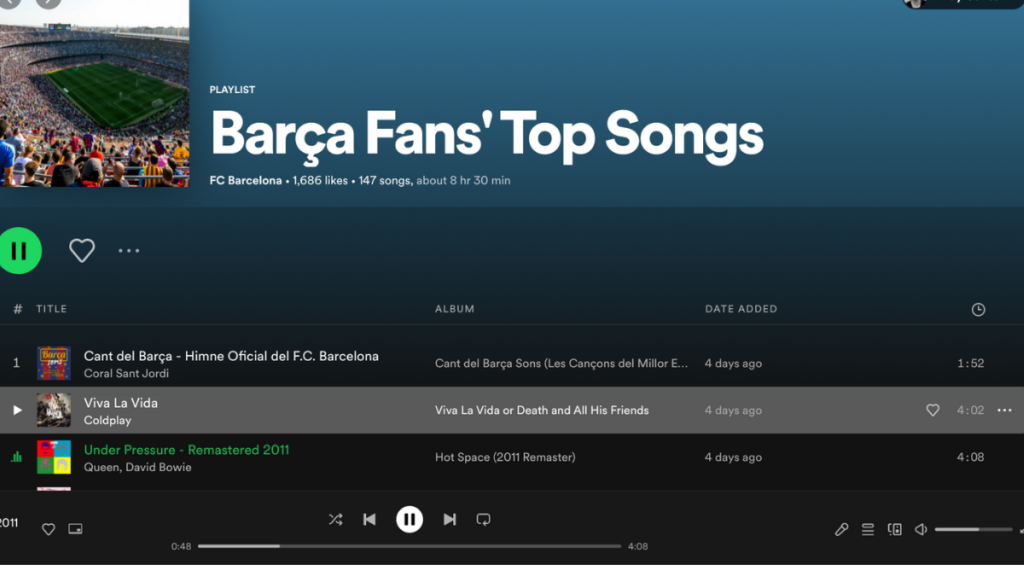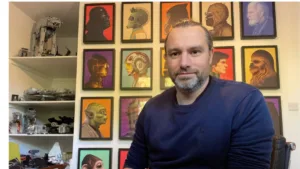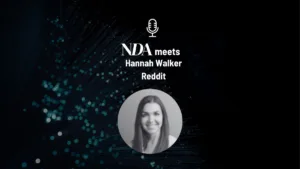Mediacells CEO Brad Rees on the audience value of the Spotify-FC Barcelona deal
The kick-off track on the official Woking FC Spotify playlist is Town Called Malice by The Jam and it feels right. Taken from their final studio album, The Gift, 40 years ago, it is still a banger and Paul Weller, Bruce Foxton and drummer Rick Buckler are local Woking lads made rock n roll stars.
At the other end of the scale, Spotify has just signed a sponsorship agreement with FC Barcelona, to the value of an estimated 280 million euros. The four-year deal, where Spotify becomes the main club partner from July, is worth twice as much as Sony Music Entertainment paid for Bob Dylan’s 60-year canon of recordings in January this year.
Media interest in the partnership has gone global, with some social media listening platforms putting a reach figure of the news at close to 300 million people.
Given the legions of FC Barcelona fans across the world and Spotify’s claim that most are under 30 – the opening track of the only official FC Barca Spotify playlist feels a bit poe-faced.
The Cant del Barça or Barça Chant kicks off the pioneering playlist. It’s a very formal composition, the choristers sound like they are being held at gunpoint, ordered to belt out some jingoistic choral drills to some military drum rolls – it’s more evocative of a Seventies’ banana republic national anthem than a ‘first-of-its-kind partnership to bring music and football together’.
Next up is Coldplay’s Viva la Vida, a retelling of the French Revolution and likely to resonate weakly with the under-30s, who would all have been max sixteen when the 2008 baroque pop dropped.
The official playlist doesn’t get much better and in the grand scheme of things it’s just an opportunity missed to acquire listeners / likes / streams (current followers just under 6k).
It potentially indicates a disconnect between what real fans want and the clunky marketing vision of a corporation who thinks they know what fans want.
Buying in an audience can work. The New York Times recently acquired longform sports journalism outfit The Athletic for half a billion dollars to notch up its registered users to 10 million.
Spotify are similarly on a mission to grow the music brand worldwide and the Swedish music streaming giant claims, “there are few partners (like FC Barcelona) that (sic.) have this sort of scale and global reach.”
According to Catalan newspaper Sport the deal could have been much more than double Dylan’s ditties, if the addressable audience were more quantifiable.
The daily tabloid, aimed primarily at Barcelona supporters, claims that of the 350 million Barca fans, just 1% of them are registered with the club. There is no accredited source to underpin the claim but at the same time there is no one refuting it either.
The business intelligence reaction to the 350 million fan number is ‘so what’.
The old Madmen bollocks of ‘half my advertising spend is wasted; the trouble is, I don’t know which half’, is utterly outmoded in 2022. Spotify, Netflix, Amazon, Meta, Neuralink all earnestly know the value of real customer data.
First party data is the top priority in elite sport. Marketing, Communications and Commercial departments in clubs, federations and sponsors know there is a tidal wave of change on its way.
However, Chris Taylor, CIO at Telegraph Media Group reckons that his new reader acquisition model, combined with bespoke Adobe audience tools has tripled daily registration rates at the Torygraph.
Sophisticated, real-time analytics now enable readers, fans, customers, users, whatever you want to call us, to interact deeper with content and events. This enables media owners and I would include football clubs here, to understand what is hot / not so that recommendations for offers, features and channels can convert to 100% knowing where your advertising is being wasted.
With unemotional, structured analytics – insights teams can now confidently inform content strategies at scale and optimise digital experiences by audience or in Barca’s case, by fanbase.
But just as the big data owners of the 21st century instinctively know when customer information is thin on the ground or stadium, so too do Barca fans know a camp Nou (see what I did there) Spotify playlist when they see one. You can ‘own’ customer data but knowing how to use it is where the magic is not machine driven.
Number 134 in Barcelona’s official, hastily-curated Barca Fans’ Top Songs playlist is Queen’s stadium staple We Are the Champions, followed at #135 by AC/DC’s hard rock classic Highway to Hell, let’s hope the former wins through in the battle for future attributed audiences and mega club fan engagement.









